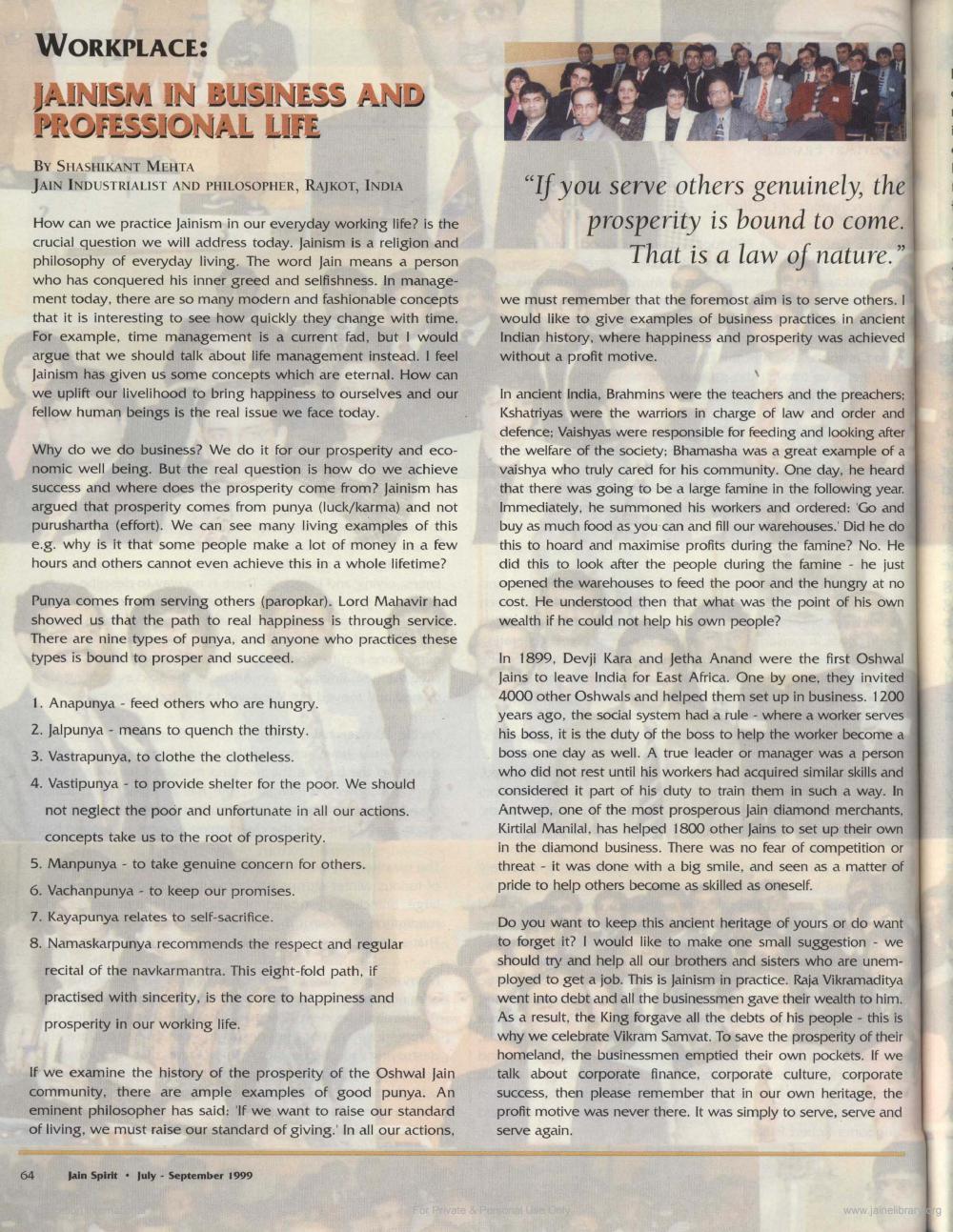________________
WORKPLACE:
JAINISM IN BUSINESS AND PROFESSIONAL LIFE
BY SHASHIKANT MEHTA
JAIN INDUSTRIALIST AND PHILOSOPHER, RAJKOT, INDIA
How can we practice Jainism in our everyday working life? is the crucial question we will address today. Jainism is a religion and philosophy of everyday living. The word Jain means a person who has conquered his inner greed and selfishness. In management today, there are so many modern and fashionable concepts that it is interesting to see how quickly they change with time. For example, time management is a current fad, but I would argue that we should talk about life management instead. I feel Jainism has given us some concepts which are eternal. How can we uplift our livelihood to bring happiness to ourselves and our fellow human beings is the real issue we face today.
Why do we do business? We do it for our prosperity and economic well being. But the real question is how do we achieve success and where does the prosperity come from? Jainism has argued that prosperity comes from punya (luck/karma) and not purushartha (effort). We can see many living examples of this e.g. why is it that some people make a lot of money in a few hours and others cannot even achieve this in a whole lifetime?
Punya comes from serving others (paropkar). Lord Mahavir had showed us that the path to real happiness is through service. There are nine types of punya, and anyone who practices these types is bound to prosper and succeed.
1. Anapunya feed others who are hungry.
2. Jalpunya means to quench the thirsty.
3. Vastrapunya, to clothe the clotheless.
4. Vastipunya - to provide shelter for the poor. We should not neglect the poor and unfortunate in all our actions. concepts take us to the root of prosperity.
5. Manpunya to take genuine concern for others.
6. Vachanpunya - to keep our promises.
7. Kayapunya relates to self-sacrifice.
8. Namaskarpunya recommends the respect and regular recital of the navkarmantra. This eight-fold path, if practised with sincerity, is the core to happiness and prosperity in our working life.
If we examine the history of the prosperity of the Oshwal Jain community, there are ample examples of good punya. An eminent philosopher has said: 'If we want to raise our standard of living, we must raise our standard of giving. In all our actions,
64
Jain Spirit
•
July-September 1999
For Private
"If you serve others genuinely, the prosperity is bound to come. That is a law of nature."
35
we must remember that the foremost aim is to serve others. I would like to give examples of business practices in ancient Indian history, where happiness and prosperity was achieved without a profit motive.
In ancient India, Brahmins were the teachers and the preachers: Kshatriyas were the warriors in charge of law and order and defence; Vaishyas were responsible for feeding and looking after the welfare of the society: Bhamasha was a great example of a vaishya who truly cared for his community. One day, he heard that there was going to be a large famine in the following year. Immediately, he summoned his workers and ordered: 'Go and buy as much food as you can and fill our warehouses. Did he do this to hoard and maximise profits during the famine? No. He did this to look after the people during the famine - he just opened the warehouses to feed the poor and the hungry at no cost. He understood then that what was the point of his own wealth if he could not help his own people?
In 1899, Devji Kara and Jetha Anand were the first Oshwal Jains to leave India for East Africa. One by one, they invited 4000 other Oshwals and helped them set up in business. 1200 years ago, the social system had a rule - where a worker serves his boss, it is the duty of the boss to help the worker become a boss one day as well. A true leader or manager was a person who did not rest until his workers had acquired similar skills and considered it part of his duty to train them in such a way. In Antwep, one of the most prosperous Jain diamond merchants, Kirtilal Manilal, has helped 1800 other Jains to set up their own in the diamond business. There was no fear of competition or threat it was done with a big smile, and seen as a matter of pride to help others become as skilled as oneself.
Do you want to keep this ancient heritage of yours or do want to forget it? I would like to make one small suggestion - we should try and help all our brothers and sisters who are unemployed to get a job. This is Jainism in practice. Raja Vikramaditya went into debt and all the businessmen gave their wealth to him. As a result, the King forgave all the debts of his people - this is why we celebrate Vikram Samvat. To save the prosperity of their homeland, the businessmen emptied their own pockets. If we talk about corporate finance, corporate culture, corporate success, then please remember that in our own heritage, the profit motive was never there. It was simply to serve, serve and serve again.
www.jainelibrarg




